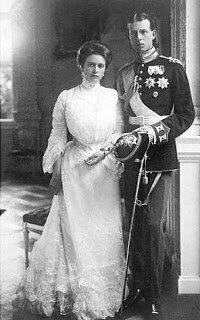[May 7, 2016]
I’ve been reading the biography of Princess Alice (Alice by Hugo Vickers), a great-granddaughter of Queen Victoria, who was the mother of Prince Philip (the husband of Queen Elizabeth II). I bought it because I had been wondering how Prince Philip came to be Orthodox, and it’s because his father was a Greek prince. He and all his sisters were baptized Orthodox.
 Princess Alice’s aunts were St. Elizabeth the New Martyr and Tsarina St. Alexandra the New Martyr, so it’s no surprise that Tsar Nicholas II attended her 1905 wedding. This anecdote shows a completely different side to his personality—funloving, carefree—which is consoling to hear.
Princess Alice’s aunts were St. Elizabeth the New Martyr and Tsarina St. Alexandra the New Martyr, so it’s no surprise that Tsar Nicholas II attended her 1905 wedding. This anecdote shows a completely different side to his personality—funloving, carefree—which is consoling to hear.
It was the custom in Darmstadt to throw rice and satin slippers at newlyweds as they departed. At this royal wedding people were lining the road six deep, hoping for a glimpse when the happy couple drove by in their carriage.
«[Tsar Nicholas] went straight for the backs of the people, who were anxiously awaiting the passing of the royal carriage. Putting his head down, he rammed them and gradually pushed his way through the six files of human beings, shedding the children from his coattails on the way, and reaching the street at the moment when the carriage was going by with Princess Alice bowing her acknowledgements to the cheering crowd.»
Instead of throwing a sprinkling of rice, the Tsar threw the whole bag, which hit Alice squarely in the face. He then threw a satin shoe, but Alice caught it:
«Casting dignity aside she caught the shoe, and leaning over the back of the carriage hit the emperor on the head with it, at the same time telling him exactly what she thought of him, which so overcame him that he stood still in the middle of the road shrieking with laughter.
After this the bride and groom transferred into their new car, a gift from the Tsar in a soberer moment before he began to enjoy the wedding.»
It’s a happy image. Another anecdote from the Orthodox wedding service (they had three weddings: civil, Lutheran, and Orthodox) is that Alice was born mostly deaf, and though she read lips well, it was harder when the speaker had a beard and moustache. When the priest asked her if she had come to the wedding of her own will, she said “No,” and when he asked if she had promised herself to any other man, she said “Yes.”
